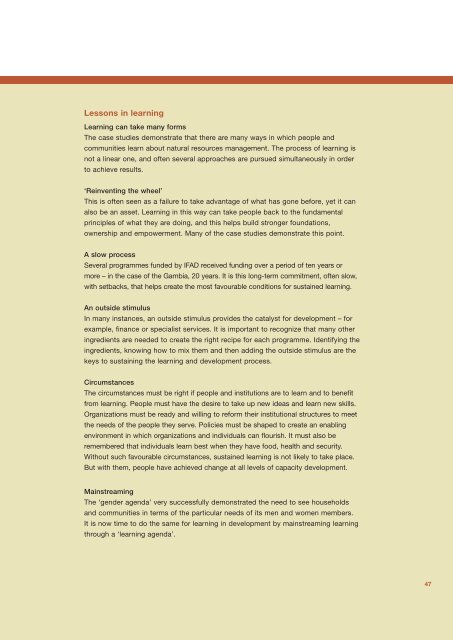Community-based natural resource management - International ...
Community-based natural resource management - International ...
Community-based natural resource management - International ...
Create successful ePaper yourself
Turn your PDF publications into a flip-book with our unique Google optimized e-Paper software.
Lessons in learning<br />
Learning can take many forms<br />
The case studies demonstrate that there are many ways in which people and<br />
communities learn about <strong>natural</strong> <strong>resource</strong>s <strong>management</strong>. The process of learning is<br />
not a linear one, and often several approaches are pursued simultaneously in order<br />
to achieve results.<br />
‘Reinventing the wheel’<br />
This is often seen as a failure to take advantage of what has gone before, yet it can<br />
also be an asset. Learning in this way can take people back to the fundamental<br />
principles of what they are doing, and this helps build stronger foundations,<br />
ownership and empowerment. Many of the case studies demonstrate this point.<br />
A slow process<br />
Several programmes funded by IFAD received funding over a period of ten years or<br />
more – in the case of the Gambia, 20 years. It is this long-term commitment, often slow,<br />
with setbacks, that helps create the most favourable conditions for sustained learning.<br />
An outside stimulus<br />
In many instances, an outside stimulus provides the catalyst for development – for<br />
example, finance or specialist services. It is important to recognize that many other<br />
ingredients are needed to create the right recipe for each programme. Identifying the<br />
ingredients, knowing how to mix them and then adding the outside stimulus are the<br />
keys to sustaining the learning and development process.<br />
Circumstances<br />
The circumstances must be right if people and institutions are to learn and to benefit<br />
from learning. People must have the desire to take up new ideas and learn new skills.<br />
Organizations must be ready and willing to reform their institutional structures to meet<br />
the needs of the people they serve. Policies must be shaped to create an enabling<br />
environment in which organizations and individuals can flourish. It must also be<br />
remembered that individuals learn best when they have food, health and security.<br />
Without such favourable circumstances, sustained learning is not likely to take place.<br />
But with them, people have achieved change at all levels of capacity development.<br />
Mainstreaming<br />
The ‘gender agenda’ very successfully demonstrated the need to see households<br />
and communities in terms of the particular needs of its men and women members.<br />
It is now time to do the same for learning in development by mainstreaming learning<br />
through a ‘learning agenda’.<br />
47

















